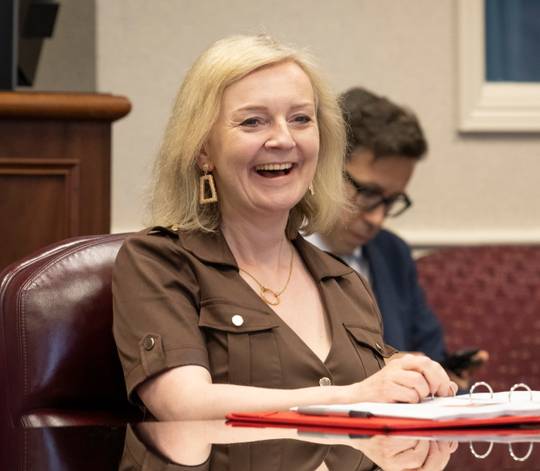Truss (1975- ) came from a middle class leftist academic background and was Chairman of the Liberal Club while reading PPE at Merton College, Oxford. She joined the Conservatives in 1996 and worked for Shell and Cable and Wireless before becoming MP for South-West Norfolk in 2010. She rose rapidly within the succession of Conservative governments after 2010, serving as President of the Board of Trade and Foreign Secretary, before winning the leadership election through support from party membership in August 2022 after Boris Johnson’s forced resignation.
Truss campaigned as a Thatcherite and offered a breath of fresh air to the stale environmentalist socialism into which Conservative party politics had descended. However, her cabinet was neither broad-based nor inspiring, the most notable talents left out being the incumbent Home Secretary Priti Patel (1972- ) and the immensely experienced John Redwood (1953- ), who could have brought both expertise and solid free-market principles to the Exchequer.
The bond market was already vulnerable before Chancellor of the Exchequer Kwasi Kwarteng (1975- )’s “mini-Budget” of September 23, because the Bank of England had raised interest rates by only 0.5% to 2.25% the previous week compared to the Fed’s 0.75% to 3%, when British inflation was already higher than U.S. and the pound weak against the dollar. The mini-Budget itself returned policy towards Thatcherism with £45 billion of tax cuts, but those were dwarfed by the £60 billion cost of an Energy Price Guarantee for the next two years, an entirely un-Thatcherite and economically counterproductive measure (because it would subsidize energy consumption at a time of scarcity).
The modest bond market hiccup that resulted was then deemed to require Bank of England intervention because the dozy British pension funds had played derivatives games during the decade of artificially low interest rates and had left themselves exposed. Truss responded by axing Kwarteng’s £2 billion cut in the top rate of income tax, putting “blood in the water” for the markets, the media and the Left, then firing Kwarteng and replacing him with the leftist Jeremy Hunt (1966- ). Her departure was inevitable; a pity since in some respects, such as tolerating fracking, she had been a considerable improvement over the henpecked Johnson, but not on immigration, where she fired her admirable hard-line Home Secretary Suella Braverman (1980 - ).
Even though Truss was Britain’s shortest serving prime minister at 49 days, there have been several worse ones in recent decades, notably May, Brown, Major and Heath. Nevertheless, Truss herself would doubtless admit she underperformed her potential.
